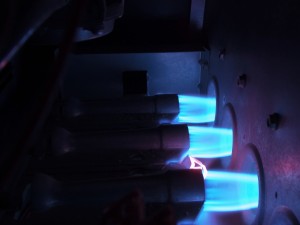 One of the trickiest parts of navigating a new heating system installation for a house is figuring out energy efficiency ratings and what they mean. People want their heating systems to use less energy if possible, but they may not understand what the efficiency ratings mean and if it’s worth it to pay more to install a high-efficiency system.
One of the trickiest parts of navigating a new heating system installation for a house is figuring out energy efficiency ratings and what they mean. People want their heating systems to use less energy if possible, but they may not understand what the efficiency ratings mean and if it’s worth it to pay more to install a high-efficiency system.
Making the choice for a new central heating system is much easier when you have the assistance of our Madera, CA, HVAC experts. It’s our job to see you have the right heating system for your house, and we’ll assist you with figuring out efficiency ratings and all the other important factors that go into new system selection.
In this post, we’ll look at an example of where efficiency ratings can be confusing for homeowners, which is how the AFUE ratings for furnaces differ between gas and electric models.
Annual Fuel Utilization Efficiency
AFUE stands for Annual Fuel Utilization Efficiency, and it’s the standard measurement for furnace efficiency. It’s expressed as the percentage of a furnace’s energy source it converts to heating power. A 90% AFUE gas furnace converts 90% of its gas into heat for the home and loses 10% to exhaust.
“Wow, This Electric Furnace Has 100% AFUE!”
If you look at an electric furnace, you’ll see that it has 100% AFUE. In fact, any electric furnace you look at will have this same rating. You can’t get better than using 100% of an energy source. So an electric furnace must be the better choice for a house when it comes to saving energy, right?
Well, no … and this is what can be tricky about AFUE ratings. AFUE is not a guarantee of energy savings, because that percentage doesn’t account for the cost of energy. All electric furnaces have 100% AFUE ratings because that’s just the way they operate. Electrical resistance heating doesn’t lose energy to exhaust because there is no exhaust. All the electricity is turned into heat as it moves through the heating elements. A gas furnace loses some energy to exhaust gases, although most furnaces have greater than 90% AFUE.
The difference here is the cost to use electricity for heating vs. using natural gas. Electricity is usually more expensive, and this is why an electric furnace on average costs more to run over a season compared to a gas furnace. Most homes that have a natural gas connection will opt for a gas furnace, not just because of the cost of gas compared to electricity, but because gas furnaces have higher heating power and work faster at providing warmth.
Choosing the right heating system
You may have the choice between gas and electric already decided for you, such as if you have an all-electric house. But you’ll still need to make other choices for a new heating system, and you’ll need our professional assistance to ensure you end up with a heater that will work both efficiently and effectively for your household for many years. You can trust to our many decades of expertise to ensure you have the right comfort system.
Schedule your heating installation in the Central Valley with Purl’s Sheet Metal & Air Conditioning. “Quality Is the Cornerstone of Our Success” since 1952.

